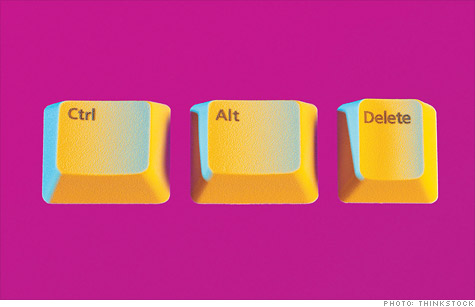Search News

NEW YORK (CNNMoney) -- For nearly three decades, personal computer makers thrived by building their PCs around two key ingredients: Intel chips and Microsoft Windows.
It's an unprecedented success streak in the fast-changing tech market, where new technologies displace old ones in an eyeblink. But now, it looks like the "Wintel" party is finally winding down.
Hewlett-Packard's (HPQ, Fortune 500) announcement Thursday that it wants out of the PC business is a dramatic confirmation of some grim trends. PC sales have slowed to a crawl, growing just 2% worldwide last quarter and falling 6% in the United States.
The bad economy is a factor. But with the growth of Web-based applications, cloud storage, and tablets like the iPad, HP and others aren't convinced that consumers will ever clamor for PCs again.
"The tablet effect is real," HP CEO Leo Apotheker said Thursday on a conference call with analysts. "Consumers are changing how they use PCs."
In the new "post-PC" era, razor-thin profits are no longer attractive.
"The PC business only returns a few points of margin. HP is really good, and they only return 5%," said Martin Reynolds, analyst at Gartner. "Staying in the PC business is relatively risky. Who knows where these things will go over the next few years?"
Fully integrated hardware and software systems like Apple's iPhone, iPad and Macintosh are becoming more sought-after in the technology industry. Apple does not break out its segment profits, but it is the eighth most-profitable company on the Fortune 500.
That gave Apple (AAPL, Fortune 500) -- the third-largest and fastest-growing PC maker in the country -- grounds to declare the beginning of the "post-PC" era in March.
"I think what we're seeing -- what HP's move is really about -- is the aftermath of the Wintel strategy, in which you give all the profits to Intel and Microsoft," said Carl Howe, analyst at Yankee Group.
While companies like HP and Dell are getting by with single-digit margins in their PC businesses, Microsoft (MSFT, Fortune 500) is the fourth-most profitable company in the Fortune 500. Intel (INTC, Fortune 500) is 14th.
"Guess what? That model is driving them all out of business," Howe continued. "It has made companies like Apple look really smart. Wintel is falling apart."
HP would follow IBM's exit of the PC market -- albeit seven years later.
IBM's move is looking more and more prescient: When it sold its iconic PC business to Lenovo in 2004, IBM (IBM, Fortune 500) said it believed the PC market was commoditizing. It didn't want to play in a market with so little upside.
Even Microsoft appreciates the changing tide. It's planning for the post-PC era by developing a new version of Windows for tablet PCs, running on mobile chips designed by British company ARM (ARMH). That's also why it's fighting so hard to make Windows Phone work: Microsoft realizes it can't afford to be left out of the computing platform of the future.
So if we're really witnessing the "final collapse of the Silicon Valley PC era," as Howe suggested, who's next to go?
"HP could potentially be leading a pack out of PCs, but I would be surprised if others were ready right now," said Loren Loverde, analyst at IDC. "HP is making this move as a leader. Its business is so large it can exist as a stand-alone. Everyone else would have to find a buyer."
HP, which specializes in high-end PCs, sells upwards of $40 billion a year in its PC division. Dell and Acer, which are just behind HP in terms of PC units sold, make lower-end computers, bringing in around $20 billion each in sales.
If it can find a buyer, then Dell (DELL, Fortune 500) is the most likely to follow HP out the door, Loverde predicted.
"Like HP, Dell is facing pressures to align themselves like IBM and go into services and other higher-margin businesses," he said. "Maybe with more competition in that space, there's an opportunity for Dell to sell its PC business."
Samsung and Sony, which also easily survive without their PC units, would also be candidates to eventually drop PCs.
But here's the real question: Who's buying? Loverde sees just a handful of potential suitors out there, mostly Asian manufacturers like Asus, Lenovo or Toshiba.
It's been a historic run for Wintel, and PCs won't vanish from office workers' desks for a good long while, if ever. But when the world's largest PC maker throws in the towel, it's time to have a moment of silence, play "Taps" and move on. ![]()